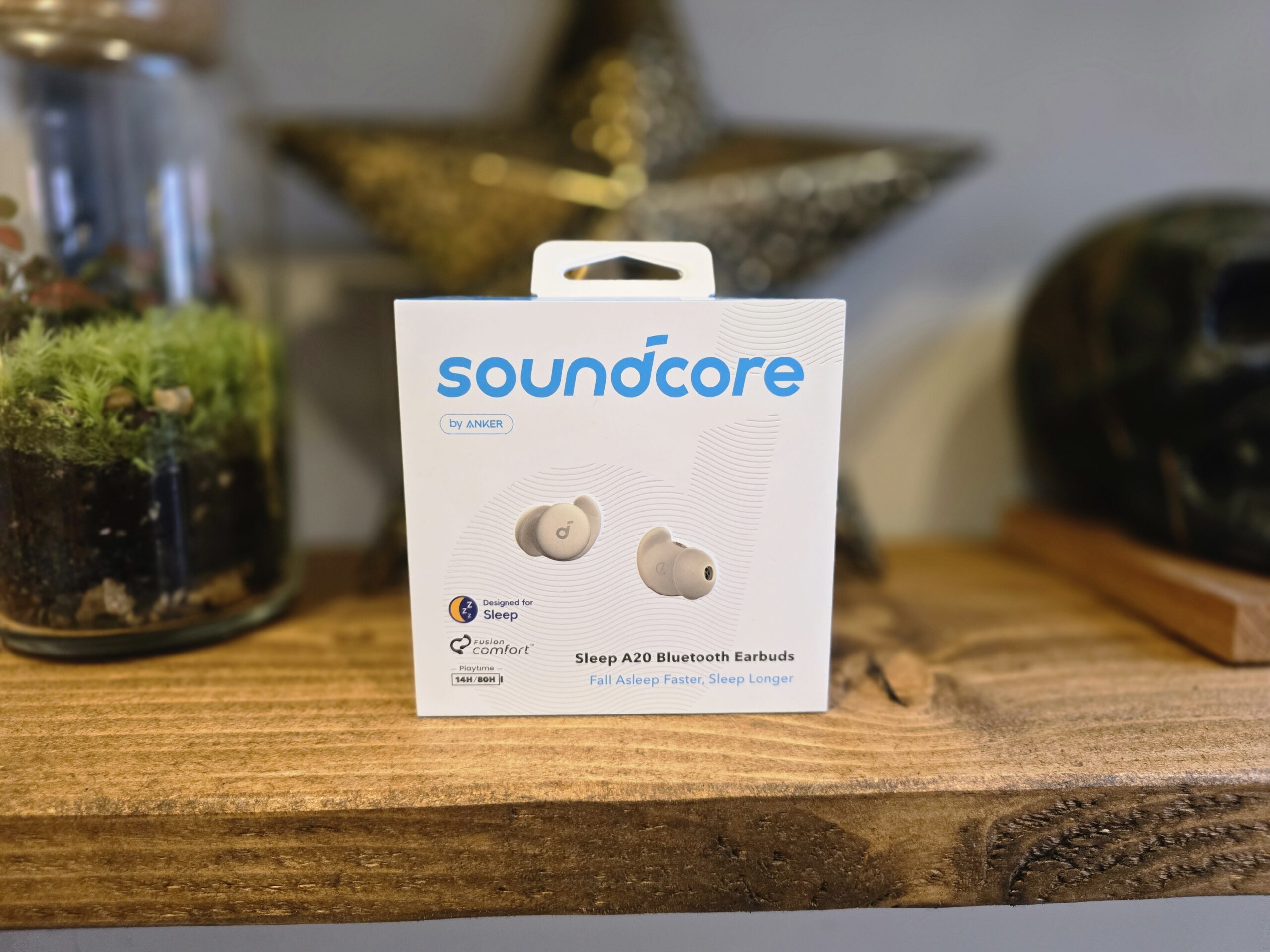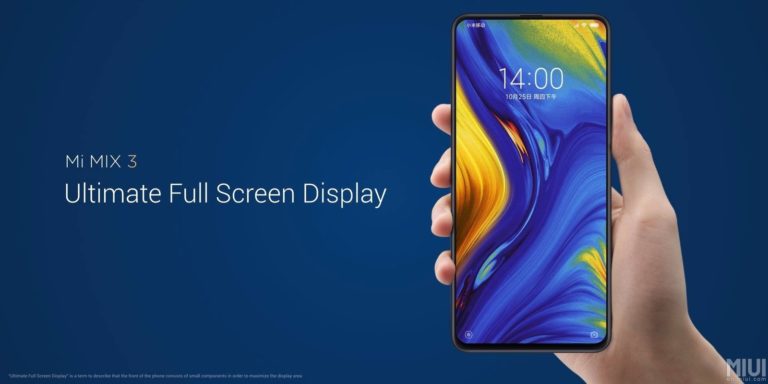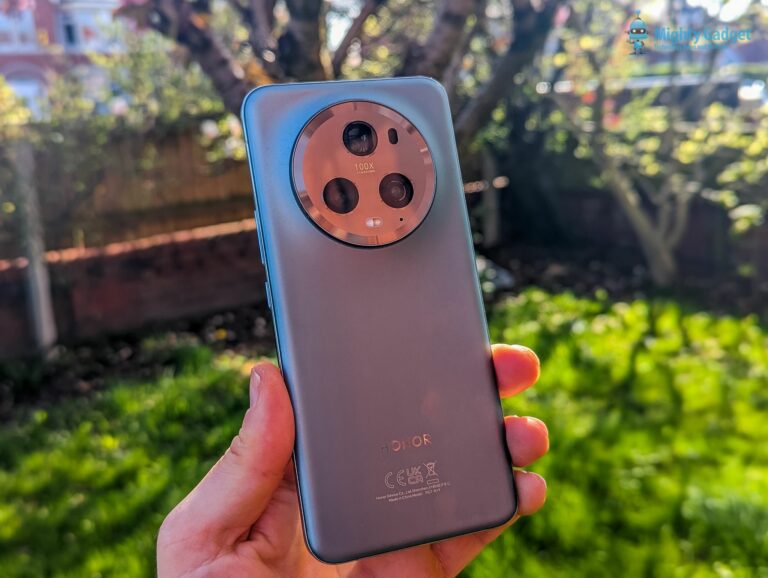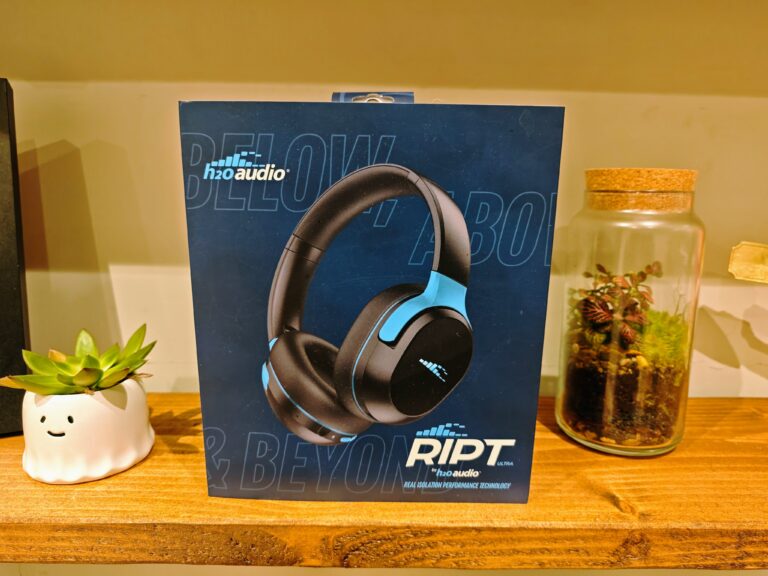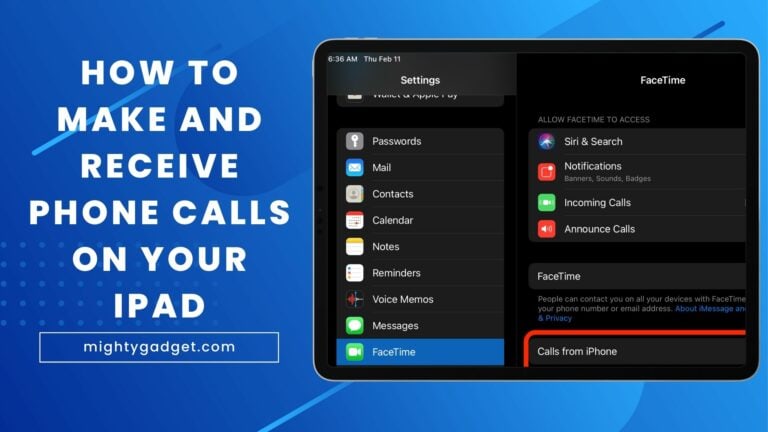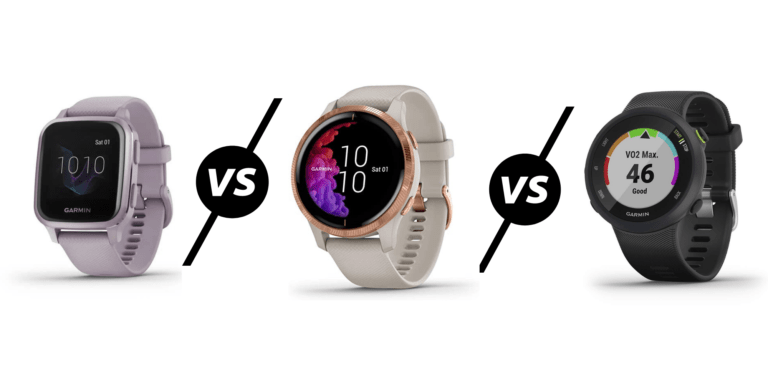Any links to online stores should be assumed to be affiliates. The company or PR agency provides all or most review samples. They have no control over my content, and I provide my honest opinion.
I have previously reviewed the Anker Soundcore Sleep A10 sleep buds, which I thought were excellent and much better than the Kokoon Nightbuds I have also reviewed.
The new Sleep A20 focuses on improved noise cancellation and a more comfortable fit for a better night’s sleep. Anker has also significantly improved the battery life to 14 hours of playtime in sleep mode or 10 hours when using Bluetooth. ‘
Just like the previous version, these rely on passive noise cancellation combined with white noise to block out unwanted noise at night rather than active noise cancellation.
Related Reviews
- Anker Soundcore Sleep A10 Bluetooth Earbuds
- Kokoon Nightbuds Review
- Withings Sleep Tracking Mat Review
- Soundasleep Bluetooth speaker pillow review
- Sleep through your partners snoring with the QuietOn Sleep
Soundcore Sleep A20 Specification
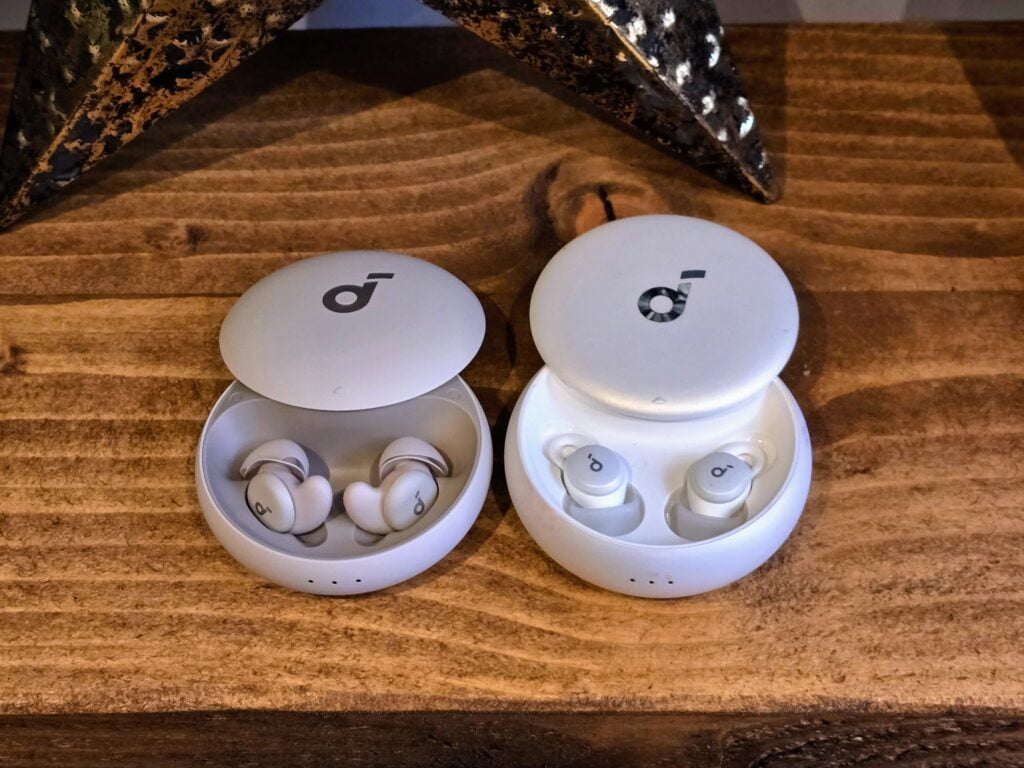
- Bluetooth 5.3
- 3x Stronger passive noise blocking
- MEMS sensor to track sleeping positions
- 14 hours of playback in night mode
- 10 hours playback with Bluetooth
- Up to 80 hours of playback with case
Noise blocking, not noise cancellation
It’s worth clarifying that the Sleep A20 earbuds rely on passive noise cancellation rather than active noise cancellation (ANC). They use a combination of the earbuds’ physical design and white noise playback to block out unwanted sounds, rather than electronically cancelling out noise like ANC headphones do.
While ANC would likely provide even better noise reduction, the passive approach still works well for reducing background noise and is less battery-intensive.
Soundcore Sleep A20 vs A10 Design & Fit
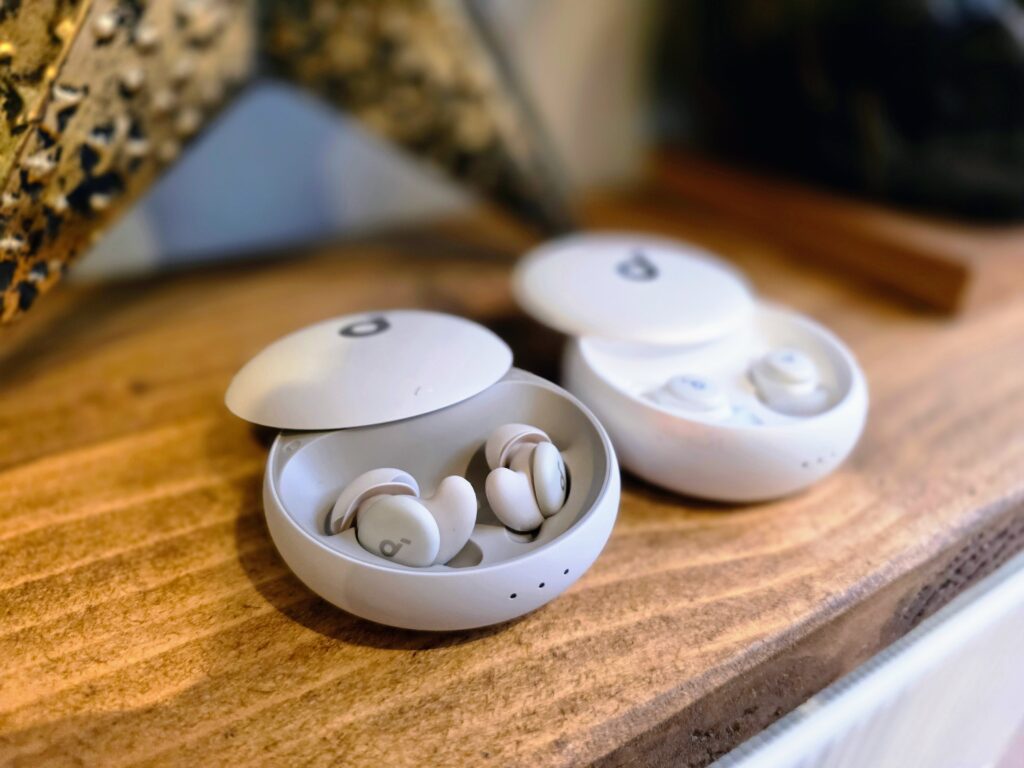
The Sleep A20 earbuds have an evolved design compared to the A10. The earbuds have a more tapered shape that sits more flush in the ear, reducing pressure points when lying on your side.
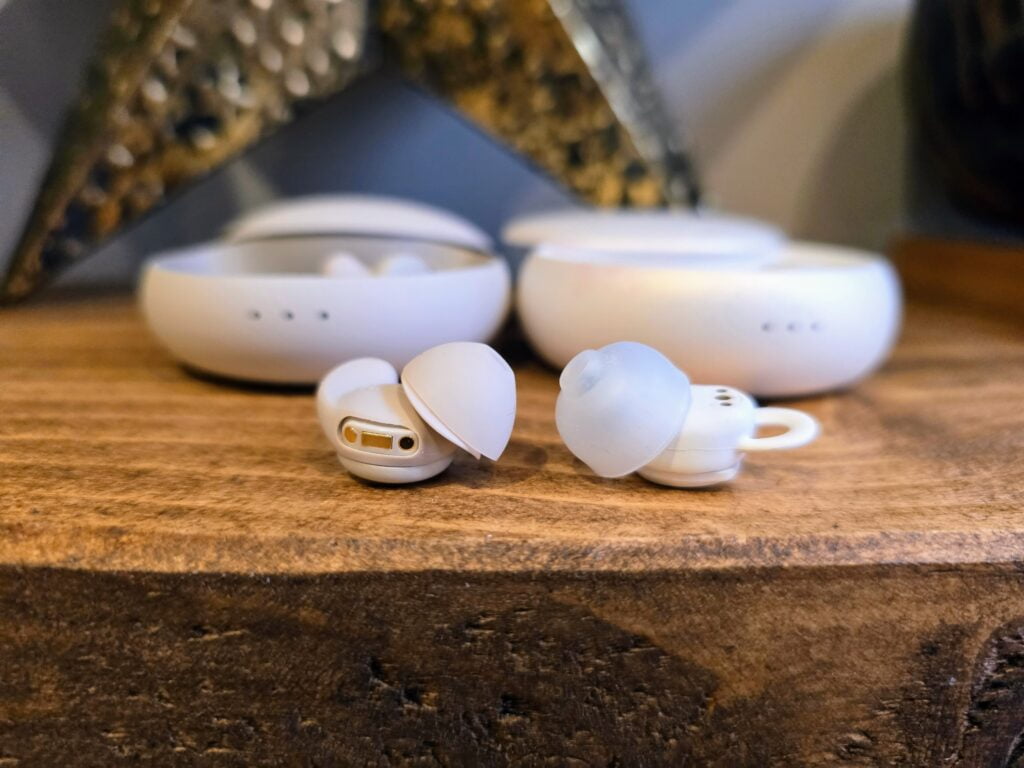
The eartip now has a double-layer design to improve passive isolation, and the wing design has changed, which fits more naturally in my ear.
Anker includes four sizes of ear tips to ensure a good fit for different ear sizes. Getting a proper seal is crucial for maximizing the passive noise isolation.
The charging case is compact and provides additional battery life, with a USB-C port for charging.
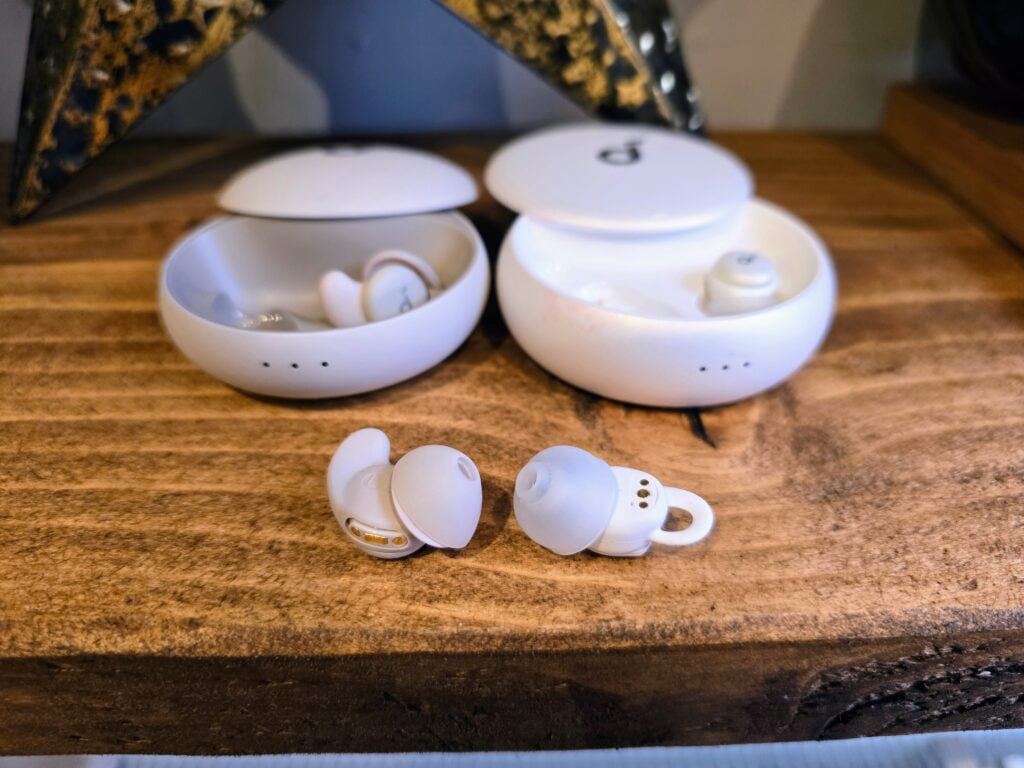
Soundcore App
The Soundcore app (available for iOS and Android) is used to control the Sleep A20 earbuds. The app allows you to choose from a library of relaxing sounds and white noise to play through the earbuds, with the ability to set a timer for playback.
You can also access the sleep-tracking data collected by the earbuds’ MEMS sensor, which detects your sleeping position and movement throughout the night.
The app is intuitive to use, though the sleep tracking data is fairly basic compared to dedicated sleep tracking devices.
Sleep Performance
Side sleeping comfort
One of the main advantages of the Sleep A20 over the previous A10 model is the improved comfort when side sleeping. The more tapered design of the earbuds reduces pressure on the ears, allowing you to comfortably lie on your side without the earbuds digging in.
I found I could sleep on my side for longer periods without discomfort compared to the A10. However, I still occasionally needed to take the earbuds out during the night, as is common with most sleep earbuds.
Passive noise cancellation
The passive noise cancellation of the Sleep A20 is noticeably better than the A10, thanks to the improved physical design and stronger noise blocking.
With a good seal from the ear tips, the earbuds do a great job of reducing background noise like traffic, appliances, and snoring.
While not as effective as ANC, the passive isolation is sufficient for most home environments. However, for very loud situations like airplane cabins, ANC would be preferable.
Noise masking – White noise without needing a Bluetooth connection to your phone
A handy feature of the Sleep A20 is the ability to play white noise directly from the earbuds without needing to maintain a Bluetooth connection to your phone.
This allows you to play soothing sounds all night without worrying about your phone’s battery life or potential disruptions from notifications. It also extends the earbuds battery life as you don’t have the Bluetooth connection draining the battery.
The earbuds have a decent selection of white noise and nature sounds to choose from, though it would be nice to have the option to add your own audio files.
The earbuds don’t require a subscription service (unlike Kokoon), but the app lacks some meditation features, but you could still use them with an app like Headspace or Calm.
Sound Quality
While sound quality is less critical for sleep earbuds compared to regular music earbuds, the Sleep A20 still delivers clear and pleasant audio reproduction. The white noise and nature sounds are convincing and effectively mask external noise.
For listening to music or podcasts before bed, the earbuds provide decent overall performance with good clarity and balance.
They can’t compete with earbuds like the Anker Soundcore Liberty 4 NC, but I am surprised by how good the sound is, considering how small they are. Using the Soundcore app, you can toggle the bass boost EQ, allowing them to produce surprisingly good bass.
While I wouldn’t use these as normal earbuds regularly myself, they could be a good option for people with small ears that struggle with earbuds.
Battery Life
Battery life is one of the standout improvements of the Sleep A20, with Anker claiming up to 14 hours of playback in night mode (white noise only) or 10 hours over Bluetooth.
This is a significant upgrade from the A10, which often struggled to last a full night for some users.
In my testing, the earbuds easily lasted a full night of sleep with white noise playback, with battery life to spare. The charging case provides multiple additional charges, giving you up to 80 hours of total playback before needing to plug in.
Sleep Tracking
The Sleep A20 earbuds include a MEMS sensor that tracks your sleeping position and movement throughout the night.
This data is synced to the Soundcore app, where you can view metrics like total sleep time, deep sleep percentage, and how often you changed positions.
While the sleep tracking is a nice addition, it’s not as comprehensive as dedicated sleep trackers like the Withings Sleep Tracking Mat.
The earbuds can’t track heart rate or breathing, and the position data is fairly basic.
I found the sleep-tracking data interesting to review but not particularly actionable. It’s a nice bonus feature but not a primary reason to choose these earbuds.
It would also be good if Anker allowed you to connect these to third-party services to sync your sleep data. At the very least they should enable Google Fit.
Price and Alternative Options
The Soundcore Sleep A20 earbuds will be available for pre-purchase via Kickstarter in the US, UK, Germany, Australia, and New Zealand starting April 16, with discounts of up to 40% for early backers. Early bird specials and perks are also available on Soundcore.com.
The Sleep A20 earbuds are expected to be available for purchase on Amazon.com and Soundcore in mid-to-late May, priced at $149.99 in the US, £119.99 in the UK, and €149.99 in Germany.
The existing Soundcore Sleep A10 are available from Anker and Amazon for £110.
Considering it is quite common for people to wear earplugs to help them sleep, you’d think sleep earbuds would be more common. Currently, there are not many reputable brands still producing similar products.
QuietOn has the 3.1 Sleep Earbuds, these lack Bluetooth or white noise, they are designed purely to block out sound and include active noise cancelling. These retail for £249.
SnoozeBand is a popular affordable alternative using a headband style design costing just £40 and there are many competing products from random brands on Amazon.
Kokoon now appears to be owned by Philips, and they still have a weird pricing model. You can buy them for £170, which includes one year of free access to their app, or £230 for two years. You can keep the earbuds after this period, but you lose access to the app, so they end up as a normal pair of earbuds but designed for comfortable sleeping.
Overall
The Anker Soundcore Sleep A20 are a good incremental upgrade from the Sleep A10. Anker has done a good job of ironing out the minor issues from the previous model.
The main improvement is the battery life. It never effected me to much on the A10 as I would normally take them out mid-way through the night, but quite a lot of people complained about them dying before a full night’s sleep, which shouldn’t happen with these.
The passive noise cancelling does seem to be better, but I still wish they had ANC, which would have made them much more appealing for use when trying to sleep on a plane.
The comfort has improved, especially for side sleeping, which is probably equally important as the extended battery. I still end up taking them out during the night, but that’s mainly because I wake up a lot anyway.
For those struggling with disrupted sleep due to noise, the Anker Soundcore Sleep A20 are an excellent option. With the limited alternative options, they are probably the best earbuds for sleeping you can buy.
Anker Soundcore Sleep A20 vs A10 Review
Summary
For those struggling with disrupted sleep due to noise, the Anker Soundcore Sleep A20 are an excellent option. With the limited alternative options, they are probably the best earbuds for sleeping you can buy.
Overall
90%-
Overall - 90%90%
Pros
- Affordable sleep earbuds vs Kokoon and QuietOn
- Excellent design that works with side sleepers
- On-device white noise provides extended distraction-free white noises
Cons
- No ANC
I am James, a UK-based tech enthusiast and the Editor and Owner of Mighty Gadget, which I’ve proudly run since 2007. Passionate about all things technology, my expertise spans from computers and networking to mobile, wearables, and smart home devices.
As a fitness fanatic who loves running and cycling, I also have a keen interest in fitness-related technology, and I take every opportunity to cover this niche on my blog. My diverse interests allow me to bring a unique perspective to tech blogging, merging lifestyle, fitness, and the latest tech trends.
In my academic pursuits, I earned a BSc in Information Systems Design from UCLAN, before advancing my learning with a Master’s Degree in Computing. This advanced study also included Cisco CCNA accreditation, further demonstrating my commitment to understanding and staying ahead of the technology curve.
I’m proud to share that Vuelio has consistently ranked Mighty Gadget as one of the top technology blogs in the UK. With my dedication to technology and drive to share my insights, I aim to continue providing my readers with engaging and informative content.

